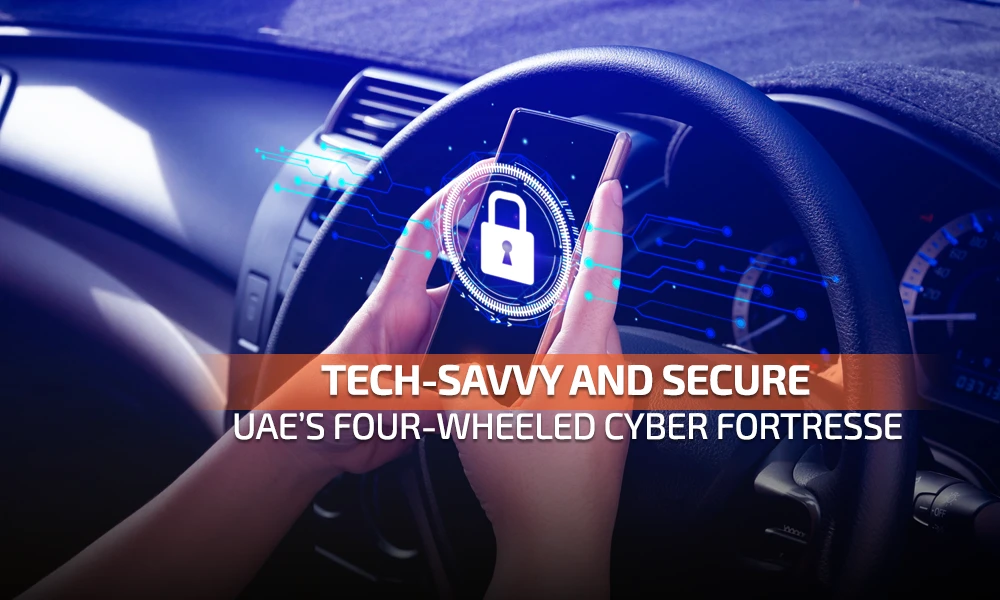Introduction: The New Digital Highway
The UAE is no stranger to innovation. From autonomous taxis cruising the streets of Dubai to intelligent road systems powered by AI, the nation is rapidly becoming a global leader in smart mobility. As vehicles evolve into computers on wheels, cybersecurity has emerged as a new frontier. Welcome to the age of cyber automotive solutions, where securing your car’s code is just as important as securing its physical frame.
With increasing digitization and connectivity in vehicles, the UAE is embracing robust security measures to ensure safe and seamless driving experiences. Initiatives like Dubai’s upcoming cybersecurity standard for autonomous vehicles are redefining what it means to drive safely—not just on the road but in the cloud too.
Dubai Leads the Cyber Charge
Cybersecurity Standard for Autonomous Vehicles
In March 2025, Dubai announced a pioneering move: the launch of a cybersecurity standard specifically for autonomous vehicles. According to Zawya, this framework will outline how driverless cars must protect themselves from cyber threats like hacking, remote hijacking, and data breaches.
This move aligns with Dubai’s vision to have 25% of all transportation become autonomous by 2030. But with this ambition comes responsibility—to ensure these vehicles are digital fortresses, equipped with the most advanced cyber automotive solutions.
The Growing Risks in Connected Mobility
From Wi-Fi to Weapon: The Risks of Vehicle Connectivity
Today’s cars are equipped with:
- GPS navigation
- Wi-Fi hotspots
- Bluetooth connections
- Smart dashboards
- AI-powered sensors
While these features offer unmatched convenience, they also open up new entry points for cyberattacks. As CarBike360 notes, modern vehicles now handle more than just horsepower—they manage your personal data, digital identity, and privacy.
That’s where cyber automotive solutions step in. These advanced systems aim to secure every line of code, every signal exchange, and every piece of transmitted data.
Key Cyber Threats to Modern Vehicles
- Remote Hijacking – Hackers gaining control of vehicle systems remotely.
- Data Breaches – Theft of personal data such as location history, contacts, and driver behavior.
- Malware Injection – Infecting the car’s system through third-party apps or software updates.
- System Override – Interfering with AI functions such as emergency braking or lane assist.
The emergence of these threats necessitates powerful cyber automotive solutions that go beyond antivirus protection. They require real-time, AI-driven cyber defenses embedded in vehicle architecture.
Tech-Savvy Measures: How UAE Is Building Cyber Fortresses on Wheels
1. Layered Software Security
UAE-based developers and car manufacturers are adopting multi-layered security protocols. These include:
- Encrypted communication channels
- Secure over-the-air (OTA) updates
- Firewalls for internal networks
This layered approach ensures that even if one barrier is breached, the attacker hits another wall.
2. Blockchain-Backed Access Management
Innovators are also exploring blockchain to decentralize data access and authentication, making it nearly impossible for unauthorized users to access vehicle systems.
3. AI Surveillance Systems
AI-powered radar and camera technologies are now being used not only to improve driver safety but also to detect unusual digital behavior within a vehicle’s ecosystem.
You can read more about this in our feature:
New AI Radars in UAE: Watching Every Move on the Road
Internal Tech Meets Eco-Security
Interestingly, the push for digital security parallels the UAE’s commitment to sustainable mobility. Hybrid and electric cars are now equipped with smart energy and AI systems, which also require protection.
Explore how this green-tech and cybersecurity overlap plays out in hybrid vehicles:
Hybrid Cars Unplugged: Exploring Their Benefits, Technology, and Future Trends
Cyber automotive solutions now need to serve dual purposes—enhancing both sustainability and safety.
Regulatory Response: UAE’s Legal and Compliance Framework
The UAE’s regulators are not sitting idle. New policies are emerging to standardize automotive cybersecurity protocols, including:
- Mandatory cybersecurity audits for autonomous vehicles
- Local data hosting requirements
- Manufacturer liability for digital malfunctions
This legal ecosystem fosters trust and accountability, paving the way for mass adoption of connected and autonomous vehicles.
The Role of Manufacturers and Aftermarket Services
Car manufacturers like Tesla, BMW, and even regional players in the UAE are building cybersecurity teams that focus exclusively on in-car systems. From secure boot loaders to intrusion detection systems (IDS), the vehicle’s brain is getting the armored protection it needs.
Even aftermarket workshops and tech vendors are rolling out plug-and-play cybersecurity kits—advanced cyber automotive solutions tailored for older models that lack built-in protection.
Smart Cities, Safer Roads: Integration with Urban Infrastructure
As the UAE pushes ahead with smart city projects like Masdar City and Dubai’s autonomous mobility ecosystem, cybersecurity becomes a city-wide concern.
Imagine a smart vehicle interacting with:
- Traffic lights
- Parking systems
- Road sensors
- Charging stations
Each interaction becomes a potential cyber exchange—and a potential risk. Thus, end-to-end encryption and secured network protocols are vital components of cyber automotive solutions in a smart mobility context.
Consumer Awareness: Are Drivers Ready?
While regulators and engineers are hard at work, the end-user—the driver—must also play a part.
Key tips for UAE drivers:
- Regularly update vehicle software
- Avoid using unsecured public Wi-Fi through your car
- Use only trusted apps and devices with your infotainment system
- Enable 2FA (Two-Factor Authentication) for car apps
Educating drivers about cyber hygiene is just as essential as installing protective systems.
What’s Next? The Future of Automotive Cybersecurity in the UAE
Looking forward, the UAE’s future roadmap includes:
- National cybersecurity ratings for vehicles
- In-car biometric access
- Predictive AI that identifies threats before they happen
- Public-private partnerships to develop cutting-edge cyber automotive solutions
Dubai’s RTA (Roads and Transport Authority) and the TRA (Telecommunications Regulatory Authority) are already forming alliances with tech giants and local developers to co-create this resilient future.
FAQs
1. What are cyber automotive solutions?
They are cybersecurity systems designed to protect smart and connected vehicles from digital threats.
2. Why is automotive cybersecurity important in the UAE?
With the rise of autonomous and connected vehicles, protecting digital systems is critical to road safety.
3. How is Dubai addressing vehicle cybersecurity?
Dubai is launching dedicated cybersecurity standards for autonomous vehicles.
4. Can a hacker really control a smart car?
Yes, without proper protection, hackers can exploit vulnerabilities in connected vehicles.
5. What tech is used to secure modern cars?
AI, blockchain, encryption, and firewalls are common tools in vehicle cybersecurity.
6. Are hybrid and electric cars more vulnerable?
They have more digital systems, making cyber automotive solutions essential for them.
7. Do all UAE vehicles need cyber protection?
Yes, especially smart, connected, and autonomous models.
8. How can drivers protect their cars?
Regular software updates, secure networks, and using trusted apps help safeguard your vehicle.
9. Are aftermarket cybersecurity kits available?
Yes, many UAE workshops now offer cyber protection upgrades for older cars.
10. What’s the future of car cybersecurity in the UAE?
Biometric access, AI threat prediction, and national cybersecurity ratings are on the horizon.
Conclusion: Driving into a Digitally Secure Tomorrow
The UAE is at the cutting edge of mobility innovation, and cybersecurity is now steering the wheel. With initiatives like Dubai’s new standard, increased consumer awareness, and AI-backed defensive systems, the country is transforming its vehicles into true cyber fortresses.
But the road ahead requires vigilance, collaboration, and continuous innovation in cyber automotive solutions.
Whether you’re behind the wheel of a hybrid car or inside a self-driving shuttle in a smart city, rest assured—the UAE is committed to keeping your ride not just smooth, but secure.







